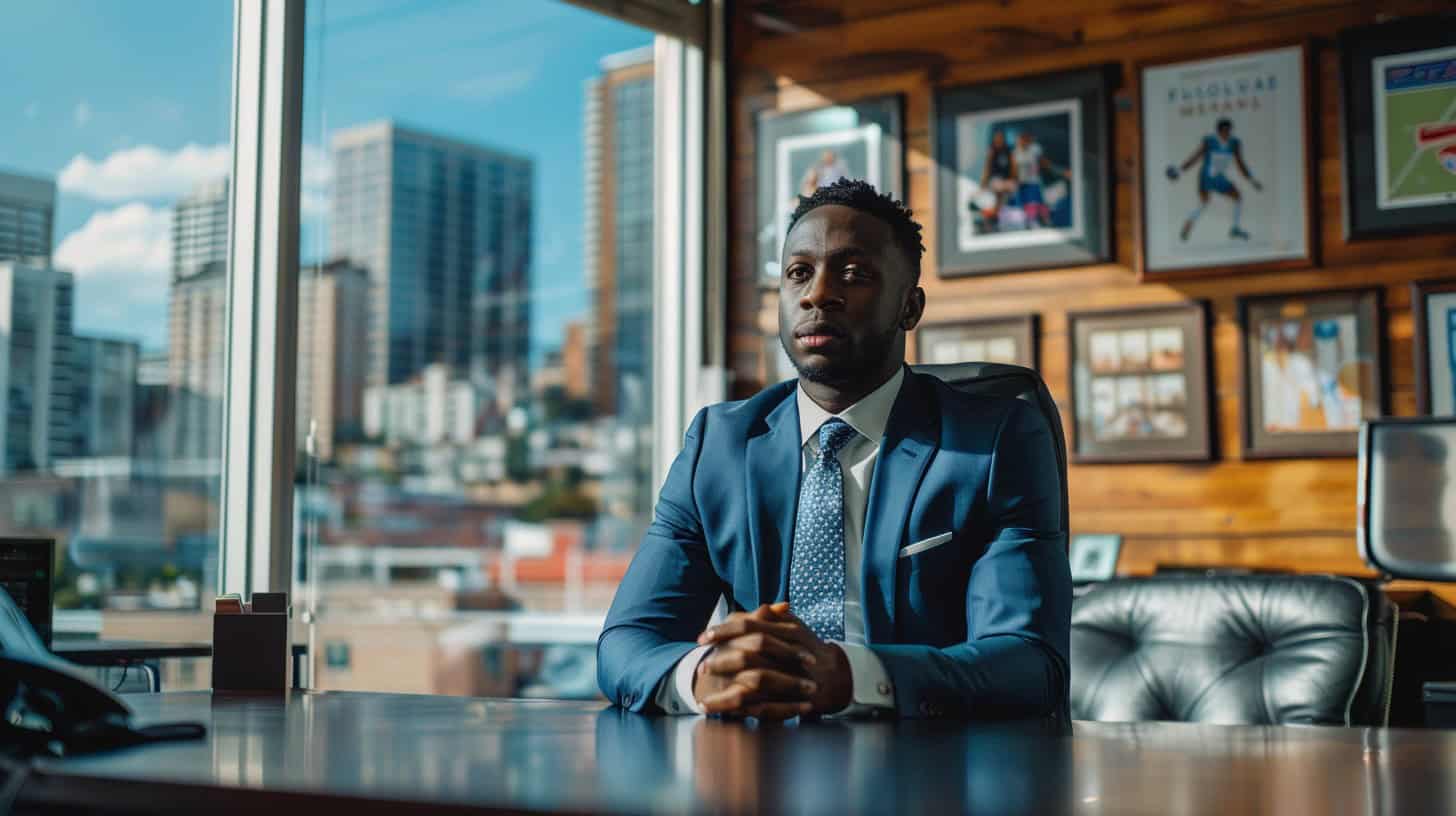Many people dream of working with professional athletes. A bachelor’s degree is the first step to becoming a sports agent. This article will show you how to launch your career in 2024, from education to earning your license.
Get ready for an exciting journey.
Key Takeaways
To be a sports agent, start with getting the right degree, like Sports Management or Law.
You need to get licensed by states and certified by leagues like the NBA and NFL.
Build skills in negotiating, understanding sports laws, and marketing athletes.
Gain real experience through internships and learning from mentors in the field.
Keep up with sports trends and rules to help your clients best.
Table of Contents
The Role of a Sports Agent
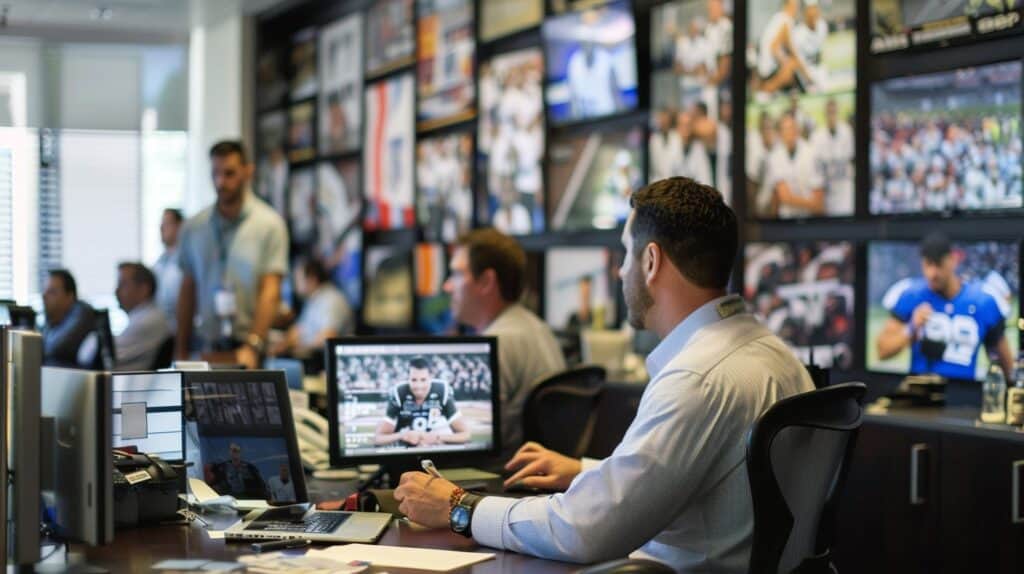
A sports agent stands by athletes to help them shine. They talk deals, plan careers, and make sure the player stays in the game’s good books.
Duties and Responsibilities of Sports Agents
Sports agents have crucial roles that include talking to sponsors and building networks. They also track the athlete’s career data and look after their financial health. These agents are always on their toes, finding new talent and dealing with the press.
Their main tasks revolve around negotiating contracts, which cover everything from salary and benefits to endorsement deals and media contracts.
A big part of their day involves reaching out to various parties—teams, companies, and even law firms—to secure the best deals for their clients. They must master public relations, understand business ethics deeply, and navigate through contract negotiations skillfully.
Sports agents act as a bridge between athletes and major opportunities in sports like basketball or football, while ensuring their clients stay clear of any legal issues.
A Typical Day for a Sports Agent
A sports agent starts the day with phone calls to teams and athletes. They discuss contracts, schedule meetings, and check on athlete needs. Data analysis is vital—evaluating player performance and market values to negotiate better deals.
Reviewing agreements takes up significant time, ensuring terms favor their clients. Amidst this, they might strategize marketing for athletes, placing a bet on the NBA Draft’s potential stars.
Weekends are busy with travel to games or meetings with clients across different states. The work doesn’t stop; watching sports becomes research, spotting talent or assessing player form.
Evenings often involve networking events or social media updates—the goal: build relationships that benefit their athletes’ careers while managing contracts worth millions annually.
Educational Routes for Aspiring Sports Agents

To kick off a career as a sports agent, picking the right studies is key. You’ll want to explore degrees in sports management or law to lay your groundwork.
Degrees Beneficial for Sports Agents
Choosing the right degree is crucial for anyone aiming to become a sports agent. Various educational paths can lead to success in this dynamic field.
- Bachelor’s in Sports Management – This degree provides a solid foundation. Students learn about the business of sports, including management principles and athlete representation.
- Master’s in Sports Management – For those looking to take their knowledge further, this advanced degree dives deeper into sports marketing, finance, and leadership skills.
- Juris Doctor (JD) – Essential for agents dealing with contracts and negotiations. A law degree equips agents with a keen understanding of legal issues in sports.
4.Master of Business Administration (MBA) – With a focus on business skills, an MBA prepares agents for financial decision-making, strategic planning, and effective communication. - Degrees in Marketing and Communications – These degrees are valuable for promoting athletes, securing endorsements, and managing public relations.
- Certifications from Players’ Unions – While not traditional degrees, certifications from entities like the Major League Baseball Players Association or the National Football Players Association are mandatory for representing athletes in those sports.
Each path offers unique advantages for aspiring sports agents, preparing them for different aspects of athlete representation and management within the industry.
High School Classes That Prepare You for This Career
Right after exploring degrees that help sports agents, it’s key to explore high school classes building the foundation for this career. Picking the right subjects can set you up for success.
- Economics classes teach the basics of supply and demand, crucial for understanding player contracts and salary caps.
- Business courses introduce students to management principles, preparing them for handling athletes’ careers.
- Marketing lessons are vital for promoting players’ names, images, and likenesses effectively.
- Communication skills gained from English and public speaking classes aid in negotiations and networking.
- Sports management or sport business classes, if available, provide a direct insight into the industry.
- Contract law or business law courses are beneficial for mastering negotiation processes during contract discussions.
Essential Skills and Traits for a Successful Sports Agent
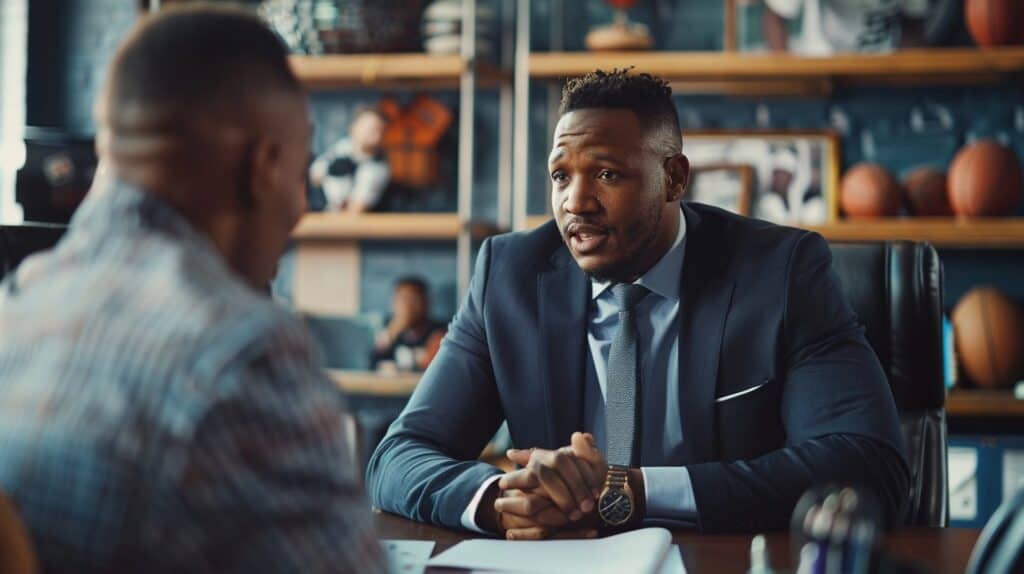
To stand out, a sports agent needs strong talking and bargaining skills. They must also be good at planning, understand the sport deeply, and stay calm under pressure.
Critical Skills Every Sports Agent Needs
A sports agent career demands more than just a love for games. Success hinges on specific skills, from talking effectively to crafting winning deals. Here’s what you need to master:
- Communication and negotiation stand as the cornerstones. You’ll persuade team managers and sponsors, always aiming to secure the best contracts.
- Analytical skills let you study players’ strengths and market values, guiding clients on when to strike deals.
- Mastering multitasking is essential, whether it’s juggling contract talks for several athletes or balancing marketing strategies.
- Time management proves crucial as you meet with teams, attend games, and scout new talent without missing deadlines.
- A deep passion for sports fuels long hours and keeps motivation high during negotiation marathons.
- Being good with numbers helps in breaking down contracts, understanding NFL salary caps or calculating commissions accurately.
- Strategic thinking enables creating long-term plans for clients, from career moves to endorsements that fit their image and goals.
Every skill sharpens your ability to guide athletes not just to any deal—but the right ones that advance their careers while maximizing earnings.
How to Master Marketing and Negotiation as a Sports Agent
Mastering marketing and negotiation is key to a sports agent’s success. These skills help in getting the best deals for clients and making a name in the sports industry.
- Understand players’ unions rules – Learn about NBA, NFL, MLB union regulations to negotiate contracts effectively.
- Stay updated with sports law changes – Keep up with updates in sports laws to protect your clients’ interests.
- Develop strong relationships with teams – Build good relationships with team managers and coaches to secure better deals.
- Use social media for branding – Employ platforms like Instagram and Twitter to boost your clients’ public image.
- Practice negotiation techniques – Regularly practice negotiating to improve your skills.
- Attend MBA programs focused on sports management – Gain advanced knowledge in finance, management, and marketing related to sports.
- Get familiar with contract details – Know inside out of contracts including minimum salary, free agents rules, and endorsement clauses.
- Connect with financial advisors and attorneys – Collaborate with experts for better contract terms and legal advice.
- Engage in online education courses on negotiation – Enhance your skills through structured learning from experts.
- Master the art of persuasion – Learn how to persuade others effectively for achieving favorable outcomes.
- Keep an eye on trends within the sports industry – Staying informed helps in making timely decisions that benefit your client.
- Market athletes for endorsements smartly – Identify brands that match your client’s image and values for meaningful partnerships.
13% Earn certifications such as licensure where required – Meeting state requirements ensures you can legally represent athletes.
By focusing on these steps, you’ll be well on your way to excelling as a sports agent, securing profitable deals for your clients while advancing their careers both on and off the field.
Certification and Licensing for Sports Agents

To work as a sports agent, you need the right papers and permissions. This means passing exams and getting approval from both states and sports groups.
State Licensing Requirements for Sports Agents
To become a sports agent, meeting state licensing requirements is crucial. Every state except Alaska, Maine, New Jersey, and Vermont requires agents to be licensed.
- Get a background check. States want to make sure you have a clean record.
- Apply for liability insurance if the state demands it. This protects you and your clients.
- Secure a business license to legally operate in the state.
- Pay attention to the application deadline — July 1, 2024, for next year’s applicants.
- Study for and pass the exam that some states require for sports agents.
- Submit all paperwork before deadlines to avoid any delays in your license approval.
- Check if your state asks for professional insurance on top of liability insurance.
This list outlines what you need to do to work as a sports agent in most states. Following these steps ensures you meet all legal requirements to start your career right.
Necessary League Certifications for Sports Agents
Becoming a sports agent requires specific certifications from major sports leagues. These certifications ensure you can legally represent athletes in negotiations and endorsements.
- For the NBA, agents must have a bachelor’s degree or show significant experience in the field. They also need to pass an exam and pay a fee. Attending annual seminars keeps their knowledge fresh.
- MLB candidates fill out an application and take an exam. Within three years, they must be officially designated as an agent to continue in this role.
- The NFL asks for a bachelor’s, master’s, or law degree from prospective agents. After meeting the educational requirement, candidates must pass an exam and attend a seminar to practice as agents.
- The NHL requires potential agents to submit an application detailing their educational and business background. Agents must also get approval from the players’ union before they can start working with athletes.
In all these cases, getting certified means studying hard, understanding legal documents like contracts, and learning how to market athletes effectively. It involves mastering negotiation skills to secure top deals for clients. Agents often attend law school or earn sports management degrees to boost their expertise. Building relationships with mentors in the industry can offer insights into successful strategies that aren’t found in textbooks.
Staying updated on changes within league rules is crucial for maintaining certification and ensuring compliance with current standards. This continuous education process helps agents provide the best support for their athlete clients, managing everything from sports pictures rights to negotiating multi-million dollar contracts with teams like the Dallas Cowboys or securing endorsements with brands under Creative Artists Agency guidance.
Each league has clear steps for initial certification and maintaining good standing as a licensed agent, which includes avoiding any criminal history that could disqualify them from representing players professionally in sports ranging from men’s college basketball to Major League Sports events.
Gaining Practical Experience in Sports Management
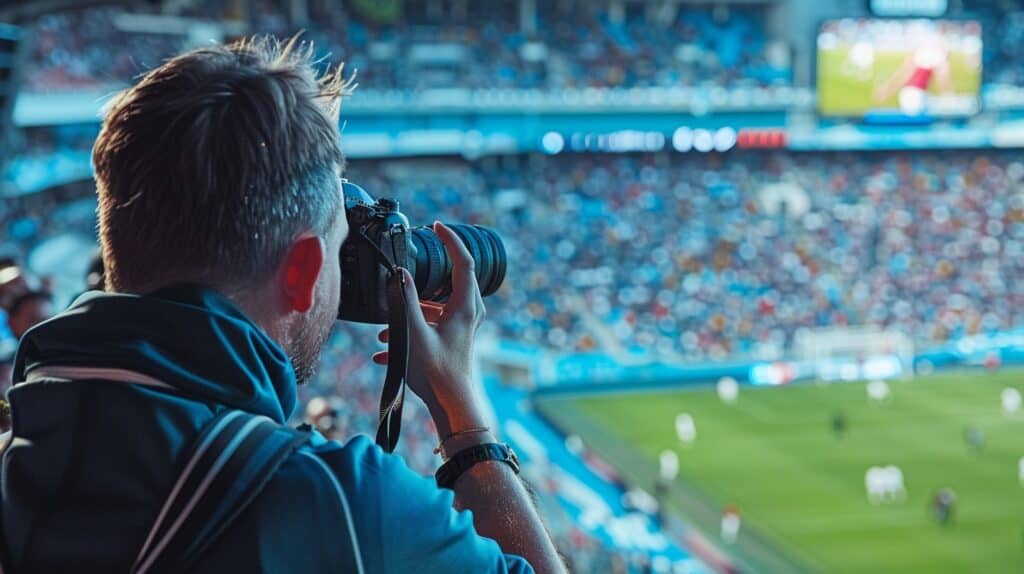
Jump into the field with hands-on practice. Internships and mentors show you the real game.
How to Find and Make the Most of Internships
Internships open doors in the sports industry. They give real work experience and build networks.
- Search online job boards like Indeed and LinkedIn for internships in marketing, contracts, public relations.
- Check Sports Management Worldwide (SMWW) for specialized agent courses that often lead to internships.
- Visit university career services, especially if you’re enrolled at places known for sports management programs like the University of Florida.
- Connect with sports agents and firms on social media platforms to learn about openings.
- Attend sports networking events and career fairs to meet industry professionals face-to-face.
- Apply for both seasonal and year-round internships to increase your chances of landing one.
- Email sports agencies directly, expressing interest in internship opportunities; include why you’re a good fit.
- Join sports-related clubs or groups in college to access talks from guest speakers who might offer internships.
- Ask professors or advisors who have connections in the sports world for leads on internships.
- Prepare a resume focused on relevant classes like those advising on contracts, marketing, or any side hustles related to sports you’ve managed.
- Practice interview skills specifically for sports management roles; know the current trends and key players like Rich Paul.
- Keep an updated LinkedIn profile showcasing your passion for sports, any relevant projects, and your desire for a career as a sports agent.
Each step brings you closer to gaining valuable experience that can kickstart your journey as a successful sports agent.
The Role of Mentors in Sports Agent Careers
After securing internships, mentorship becomes crucial. Mentors, like those from major sports leagues in the SMWW’s Athlete Management course, guide you through various career stages.
They offer first-hand experience and insights that no textbook can match. Picture a mentor as your personal guide in the complex world of sports management—someone who has already succeeded and helps you avoid common pitfalls.
For instance, Carter K.F. Chow, a renowned sports agent at Yee & Dubin Sports, could share invaluable advice on managing athletes’ careers, including negotiating contracts and endorsements.
This 8-week online course begins July 22 and costs $1950—investing in such mentorship can propel your career forward by leaps and bounds. You learn not just to manage athletes’ names, images, and likenesses (NIL) but also to master critical skills necessary for success in this competitive field.
Strategies for Building a Successful Career as a Sports Agent
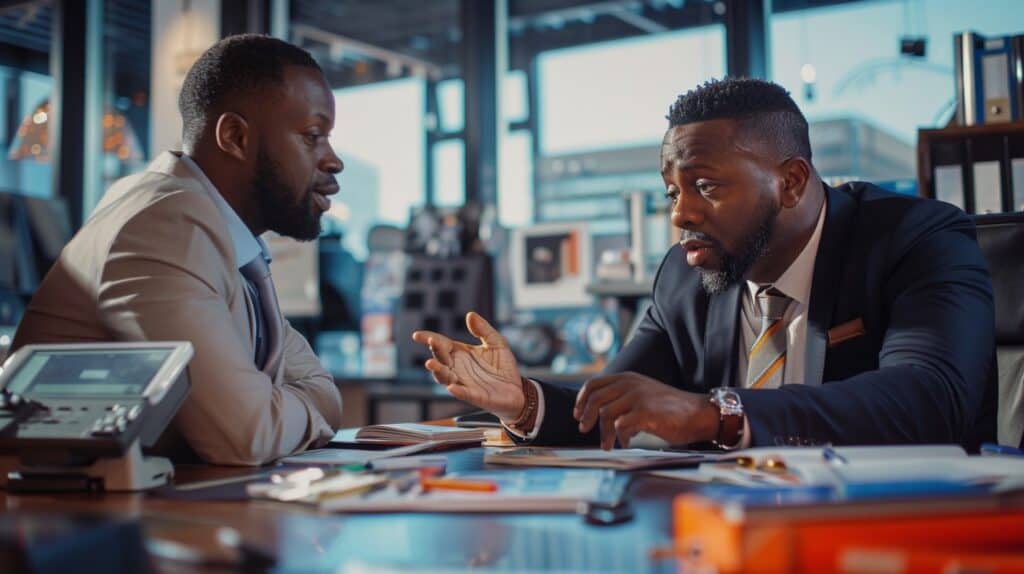
To make it big as a sports agent, networking is key—know the right people and keep those connections strong. Always stay ahead by learning about new trends in sports, like changes in rules or what fans love.
Effective Networking and Relationship Building in Sports
Effective networking and relationship building are keys to success as a sports agent. These strategies open doors to new opportunities and partnerships.
- Attend sports conferences like NASSM and NSNN events regularly. These gatherings connect you with industry leaders and potential clients.
- Create a strong online presence on platforms related to sports management. Share your insights on athletes’ rights, contracts, and endorsements.
- Offer to speak at local schools about careers in sports management. This will establish you as an expert and mentor to students.
- Volunteer for sports events in your community. It shows commitment and gets your name recognized among local athletes and teams.
- Join professional groups that focus on inclusive sports practices. Being part of these groups demonstrates that you care about fairness in sports.
- Establish a routine for following up with contacts made at events or online within 48 hours. A quick message can turn a brief meeting into a lasting connection.
7.Kindly ask satisfied clients to refer you to other athletes looking for representation, highlighting the power of word-of-mouth recommendations.
8.Connect with MBA students focusing on sports management or law students interested in athlete representation to stay ahead of emerging trends and legal practices.
9.Hold workshops on important topics like the National Collegiate Athletic Association (NCAA) rules or how athletes can manage their name, image, and likeness (NIL).
10.Offer internships at your agency for grad students passionate about sports management, building relationships with future professionals early in their careers.
These steps ensure you’re not just meeting people but making meaningful connections that fuel your career growth as a sports agent.
Keeping Up with Trends in the Sports Industry
To stay ahead, a sports agent must always know the latest trends. Billions are spent on sponsorships in sports worldwide. This means big opportunities for agents to land deals for their clients.
Agents dig into data and reports daily. They use social media, watch games, and attend events to see what’s new.
Agents also play a key role in managing NIL rights for college athletes. These rights let students make money from endorsements before going pro. Keeping up with these rules can set an agent apart from the rest.
In this game, being informed is not just good—it’s everything.
Knowing current salaries helps too. A talent agent needs this info to negotiate better contracts for their clients, whether it’s a flat fee or an hourly wage arrangement.
Next, we’ll explore how agents handle financial matters for their stars.
The Financial Landscape for Sports Agents

Sports agents deal with big money, getting a slice of the deals they make for athletes. Their pay depends on their athlete’s success and can include yearly salaries plus extras from contracts and endorsements.
Typical Salaries and Earnings for Sports Agents
Let’s talk money, specifically about what sports agents can expect to make. The financial success of sports agents largely depends on their skill set, experience, and the caliber of athletes they represent. Here’s a clear-cut view:
| Income Category | Annual Earnings |
|---|---|
| Median Salary | $84,900 |
| Top 25% | Over $129,930 |
| Average Salary Nationwide | $79,400 |
| Potential Earnings Range | $16,000 to $4 million |
Salaries can swing widely, from as low as $16,000 to as high as $4 million annually. This range tells us that agents starting out may face financial challenges, while those at the top of their game enjoy significant earnings. These figures reflect one’s ability to negotiate contracts, secure endorsements, and manage athletes’ career paths effectively.
In essence, the more successful the athletes you represent, the higher your potential earnings. Agents who consistently demonstrate a knack for marketing, negotiation, and client management can climb towards the higher end of the salary spectrum.
Securing lucrative deals for your clients increases your earnings through commissions. Thus, mastering the art of negotiation directly impacts your financial success as a sports agent.
How Sports Agents Manage Contracts and Endorsements
Now that we’ve talked about what sports agents earn, let’s focus on how they manage contracts and endorsements. This process is key for both the agent and their clients to make sure they’re getting the best deals possible.
- Learn about different leagues’ commission caps – Agents need to know that NFL caps commissions at 3%, NBA at 4%, and MLB at 5%. For marketing deals, commissions can range from 10 to 25%.
- Master negotiation skills – Being able to negotiate effectively means agents secure better contracts and endorsement deals for their athletes.
- Stay updated with league rules – Agents must be aware of specifics like how an athlete can declare for the NBA Draft or understand waivers in the National Hockey League.
- Understand salary caps and contract structures – Knowledge of salary caps for teams helps agents negotiate contracts, ensuring their athletes get fair pay.
- Build strong relationships with brands for endorsements – Networking with companies interested in sports marketing allows agents to find lucrative endorsement deals.
- Manage media contracts – Securing media appearances can boost an athlete’s profile, so agents work on getting these opportunities.
- Handle legal paperwork accurately – Ensuring contracts are legally sound protects both the agent’s clients and their own careers.
- Plan for an athlete’s financial future, including retirement planning – Agents advise on saving portions of income and investing wisely to ensure financial stability long after retirement from sports.
In summary, managing contracts and endorsements involves a mix of negotiation skills, knowledge of league rules, financial planning, and networking to secure the best opportunities for athletes.
